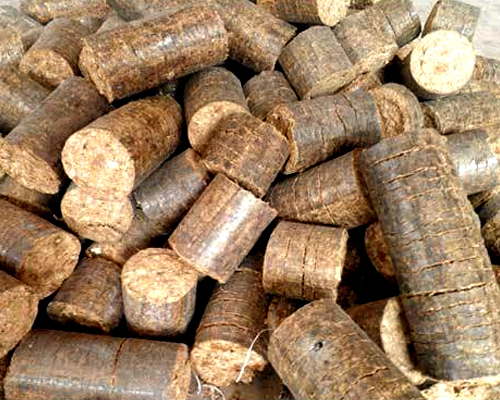Briquettes
Concept and Technology
The process of “BRIQUETTING” is the physical transformation of the loose raw material into a compact form. The form change results in a much higher specific density of the material, which increases its combustion efficiency as compared to the loose material. Briquetting (compacting) the Biomass, for fuel biomass is one of the simplest forms of using biomass. The residue left from wood, crops and harvesting can be used as fuel biomass. This way, none of it goes to waste.
Briquetting of the Saw dust , Agro waste & husk could mitigate these pollution problems while at the same time making use of this important industrial/domestic energy resource. Moreover, Loose production waste such as dust or shavings represents a considerable cost factor. By compressing this material into briquettes we can decrease costs while reducing the mess and increasing safety.
Benefits of Biomass Briquettes
Biomass briquettes offer many benefits over traditional fuels like coal, fuel oil, natural gas and propane as well as over the pre-compacted raw materials: wood chips, paper, green wood, nut shells, and various husks, fines and fibers. You can’t afford NOT to consider a briquetting system for your operation!
Cost
The purchase price of biomass briquettes is less than natural gas, propane and fuel oil. Coal is a bit lower in price, but ultimately it is NOT cheaper because of the many benefits of biomass briquettes as discussed below
Storage and Handling
Compacting biomass waste into briquettes reduces the volume by 10 times, making it much easier to store and transport than loose biomass waste. Other fuel types tend to be difficult to handle and are hazardous. Briquettes can be produced in a variety of sizes and have a long shelf-life.
Pollution
Briquettes are immeasurably cleaner than the other fuel alternatives – especially coal! Therefore, government incentives that support briquetting systems and production along with dis-incentives for coal use make briquetting solutions extremely attractive. Plus, they don’t create dust.
Efficiency
Briquettes burn in a controlled manner, slow and efficiently. They burn well in boilers and burners. More and more, utility companies are using biomass briquettes to supplement or replace coal as a solid fuel source.


